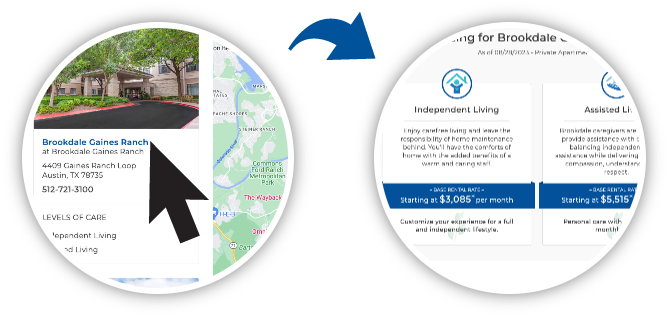- Home
- Brookdale Life
- Brookdale Blogs
- Eight Steps for Dealing with Dementia Behaviors
Alzheimer's & Dementia, Brookdale Solutions
April 7, 2017
Eight Steps for Dealing with Dementia Behaviors
Alzheimer’s and dementia behaviors can be a terrible shock that hurt, embarrass and anger you.
Crucial to dealing with dementia behaviors is recognizing that the changes you are seeing are a result of the disease and not a fundamental change in your loved one’s personality or identity. We know, for instance, that many people living with dementia experience damage to the frontal lobe of the brain, the area that is responsible for the controlling of emotional responses. Damage to this part of the brain can result in “disinhibition” and a reduction in behavioral and verbal control. Someone without dementia might think “I just want to slap that person!” when they are angry, but they don’t because their frontal lobe puts the brakes on and keeps their actions more appropriate. When dementia damages this area, those brakes may not be there anymore.
It is also important to think of behavioral expressions as just that – expressions that may be the person’s only form of communication. Most people living with dementia will eventually lose the ability to use language when expressing their unmet needs, desires and even pain and physical discomfort. We have to look beyond what they are saying and doing so we can understand what they are communicating. It’s important to search for the emotion that’s at the root of it all and ask yourself as a caregiver, “What are they trying to tell me?”
Untreated pain, frustration related to a complex task or confusion caused by difficulty comprehending communication can spark insults, resistance and lashing out if you are not “listening” to the responses of your loved one. Getting to the root of the problem often requires us to be a detective and to try to get at what is truly behind the behavior.
Here are eight steps for dementia behavior problem-solving:
- Rule out any underlying physical or biomedical reason for the behavioral expression. Visit a physician or dentist to rule out undiagnosed illness or an unknown source of pain. People with dementia may no longer be able to tell you they are hurting.
- Consider your approach—do you need to adjust how you approach and communicate with your loved one?
- Think about whether your loved one might be hungry, thirsty or excessively tired.
- Examine the immediate setting – is it noisy, too hot or cold, or uncomfortable in some other way?
- Weigh whether your loved one is bored or frustrated with daily activities that have no meaning or have become too difficult.
- Consider if he or she is isolated from others or depressed due to unfulfilled emotional and social needs.
- Think about whether the desire for physical touch is being satisfied. Even if sexual intimacy is no longer realistic or possible with a spouse, holding hands, hugging and other affectionate touches can be pleasurable and satisfying.
- Look at whether the task you are asking your loved one to do has been adjusted for their level of ability and set at their pace.
People with dementia cannot – and should not – be faulted for their behavioral expressions. Rather than reacting negatively, try to remind yourself your loved one is doing the best he or she can with the disease. However, we know that sometimes this just hurts and you shouldn’t ignore your own emotional response to the behavior. Doing so simply makes life and the responsibilities of caring more stressful.
Please talk through your feelings with people who understand and care. Dementia support groups are invaluable in this regard – coping with behavioral symptoms is a very common issue for family caregivers. Speaking with a trusted friend or a pastor could also help. This journey is difficult enough; please don’t try to go it alone. If the situation is more than you can handle, Brookdale Alzheimer’s and Dementia care can help.
Categories
- Alzheimer's & Dementia
- Caregiver's Corner
- COVID-19
- Health, Safety and Wellness
- Financial Well-Being
- Passion & Purpose
- The Journey to Senior Living
- Trending Now
- Socialization & Relationships
- Brookdale Solutions
- Brookdale Vision and Growth
Archives
View All
- October 2025
- September 2025
- August 2025
- July 2025
- June 2025
- May 2025
- April 2025
- March 2025
- February 2025
- January 2025
- December 2024
- November 2024
X
Let us help find the right community for you!
Complete the form and a Senior Living Advisor will be in touch!
Inside Brookdale Communities
See what’s happening on our community Instagram pages
Brookdale has communities near you!



